Why study Drama and Creative Writing at LJMU?
- Opportunities to perform your own work in theatre productions all over Liverpool
- Paid or voluntary work placements to improve your employability
- Three-day residential writers retreat at a country house in rural Wales
- Guest lectures from practising writers and performers
- More theatres, cinemas, literary events, arts centres, galleries and museums than any city outside London
About your course
The BA (Hons) Drama and Creative Writing at Liverpool John Moores University is taught by published authors and staff with extensive professional theatre experience.
Hear from our students about what it's like to study a Drama degree at LJMU:
There are few better places to study Drama and Creative Writing than Liverpool, with its many theatres and a rich tradition of producing some of the countrys best-known playwrights.
You will have an opportunity to write in your preferred genre and to perform, of course, but you will also learn stage management and direction, specialising as the degree progresses. This is a practice-orientated course with a very successful retention rate and run by staff with professional theatre experience as well as published writers.
LJMUs strong links with theatres, TV companies, publishers and arts organisations mean that you will have a wide choice of work placement opportunities, as well as being able to collaborate on some creative projects.
Our partners include:
- the Unity Theatre
- Liverpool Everyman and Playhouse
- Vogue
- Off the Ground Theatre
- Spike Theatre
- Splatterfest
- Liverpool FC
- Culture Company
- Ullaloom
- FourFourTwo Magazine
- Lime Pictures
- BBC
- ITV
- Granada
- Tmesis Theatre
- Ginsberg Poetry Workshop, New York
Course modules
What you will study on this degree
Further guidance on modules
Modules are designated core or optional in accordance with professional body requirements, as applicable, and LJMU’s Academic Framework Regulations. Whilst you are required to study core modules, optional modules provide you with an element of choice. Their availability may vary and will be subject to meeting minimum student numbers.
Where changes to modules are necessary these will be communicated as appropriate.
Core modules
Introduction to Scriptwriting
20 credits
20 credits
This module is designed to introduce you to the differing demands of scriptwriting for three major dramatic genres screen, stage and radio. It introduces you to the formats used in these three forms and encourages you to engage with the process of visual, verbal and aural storytelling in relation to the same.
Introduction to Prose
20 credits
20 credits
In this module, you will be tested on your ability to write using accurate and appropriate contemporary language, techniques and devices. You will scrutinise published writers' narrative strategies for important aspects of form, techniques and devices in prose, explore the links between critical and creative writing, and join in with discussion, debate and exercises.
Observation and Discovery
20 credits
20 credits
This module is designed to encourage you to develop good writerly habits and to reflect on your own development as a practising writer. It focuses on the use of your environment (the city of Liverpool) as a source and inspiration for writing, via observation, reflection and research. It allows you the freedom to write across genres and to develop your own voice, while focusing on the importance of accurate observation and critical self-reflection. The module also works to foster a sense of group identity via seminars and group work.
Performance Fundamentals
20 credits
20 credits
This module introduces you to a range of theories and approaches to acting, including aspects of voice and movement. It establishes a shared sense of ensemble and the codes of conduct and professional work ethic expected of actors. It will link your practical work to an understanding of the social and historical roots and evolving processes of the actor, alongside introducing you to a constructive vocabulary and method of observing and evaluating both your own practice and that of others.
The Physical Text
20 credits
20 credits
This practical workshop based module offers you the opportunity to explore a range of non-verbal aspects of performance text and their place in the creative and interpretive process. You will examine models of analysis and a range of examples of historical and contemporary practice where non-verbal text is the predominant mode.
Production Project 1 (Scripted)
20 credits
20 credits
This module consolidates and develops aspects of voice, movement, acting and production skills already introduced though rehearsal, leading to performance of existing texts. It provides you with the opportunity to nurture acting skills through research, rehearsal and performance.
Core modules
Contemporary Performance and Practitioners
20 credits
20 credits
This module introduces you to a range of contemporary performance forms and practitioners. It expands and enhances your level of conceptual understanding associated with critical approaches to performance, and develops your ability to write coherently about contemporary performance with appropriate academic presentation.
Script Workshop
20 credits
20 credits
This module offers you the opportunity to develop original script work through workshop application of performance and, where appropriate, directing skills. You will explore a range of texts for their performance potential alongside enhancing your understanding of dramaturgy and story structure.
Optional Modules
Screen 1
20 credits
20 credits
This module aims to further develop your awareness of screen language in relation to screenwriterly concerns and encourage you to examine the narrative devices and structures inherent in film and television productions. It will also encourage you to develop your own storytelling skills.
Treatment and Screenplay
20 credits
20 credits
This module will develop your skills in structuring and writing a treatment and a screenplay. It will encourage individual development of filmic storytelling skills in a critical, supportive environment in preparation for the longer stories you will develop and write in Level 6 Screenwriting modules.
Study Year Abroad - Drama and Creative Writing
120 credits
120 credits
The aim is to provide students with an additional year of study at an approved overseas partner that will complement their programme at LJMU. This is an additional year of full-time study at an approved higher education institution. The modules to be studied must be agreed in advance, and must be appropriate for the student's programme of study. Assuming successful completion of this year, mark-bearing credit will be awarded by the Faculty Recognition Group. The grade conversion scale to be used will be made available in advance of the year abroad.
The Fantastic
20 credits
20 credits
This module engages you in the study of fantasy, horror and science fiction literature and related arts. This has proven the most popular genre amongst undergraduate students and the module provides an opportunity for specialisation in this area. You will produce original, creative work informed by your studies, and present it to your classmates and tutors for formative feedback and further development.
Approaching Your Novel
20 credits
20 credits
Clearly, a novel can not be completed in one semester, but you should be left with an awareness of what is required to make this huge leap from short story writing. You will emerge with a proposal for its completion and a deeper understanding of what method best suits you to live with, revise, complete and place a book.
Short Prose
20 credits
20 credits
In this module you will acquire a deepening understanding of some of the forms which prose takes and learn to write a piece of original prose within a chosen form. You will study examples of short fiction and literary non-fiction, learning some of the key techniques involved. Then, you will reflect on your reading and your own creative processes.
Poetry Writing Workshop: Form and Substance
20 credits
20 credits
In this module you will focus on structural and technical aspects of poetry and on questions of subject-matter and source material, using examples of modern and contemporary poetry. You will look at students' poems in workshops, analysing them technically, providing feedback, and focusing on the specific uses of form and language.
Specialist Practices
20 credits
20 credits
In this workshop module you will develop further skills leading to a sharing of material explored in an appropriate format. You will be offered a choice of specialist areas of practice which activate and extend your awareness of the practical processes involved in creating/performing in a specialist area of Drama. You will then develop your understanding of the particular conventions and stylistic approaches within the chosen specialism, and the critical field in which it sits.
Short Story One
20 credits
20 credits
This module is designed to develop your ability to craft short stories and to broaden your independent reading, honing the ability to read as a writer. It will improve both the identification and understanding of elements of fiction-writing craft and encourage reading as a writer in greater depth. You will develop the habit of writing prescriptively (via set writing exercises that enhance your understanding of the writer's craft) and independently. You will also develop a heightened awareness of your poetics and be able to reflect on the reading that shapes your writing.
Dramatic Writing for Radio and Stage
20 credits
20 credits
In this module you will workshop your script for either radio or stage in tutor-led sessions, offering and receiving constructive criticism, reading, and performing scenes from your developing scripts. We will focus on structural and technical aspects of both forms and analyse the differences and transferable skills between the two mediums.
Drama Research and Proposal
20 credits
20 credits
This module enhances your ability to deal with advanced concepts, philosophies and critical frameworks appropriate to drama and theatre practice research. It equips you with appropriate enhanced skills in use of supporting technologies in designing and proposing a piece of focussed academic research.
Core modules
Advanced Theatre Practice 1
20 credits
20 credits
This module offers you an opportunity to extend independent preparation and practice and develop advanced skills in a chosen role. It enables you to realise work that will be useful as part of a professional portfolio or in accessing further advanced skills training.
Advanced Theatre Practice 2
20 credits
20 credits
This module is the cumulative point of application of skills and creative practice developed during the course, and provides a public platform for showing work. This creative and practical module is designed to give you the opportunity to develop and work independently with an ensemble.
Optional Modules
Prose Portfolio 1
20 credits
20 credits
This module is designed to encourage you to use the technical, cognitive and narrative skills you have acquired to produce a writing portfolio and reflection, using your own strengths and those of the community of writers of which you are a part. As the workshops are based each week on prepared readings of peer students' draft work, suggestions for wider reading and giving thoughtful and detailed critiques mean that your individual contribution is of great importance. The portfolio may consist of fiction or literary non-fiction.
Prose Portfolio 2
20 credits
20 credits
This module is designed to encourage you to use the technical, cognitive and narrative skills you have acquired to produce a writing portfolio and reflection, using your own strengths and those of the community of writers of which you are a part. As the workshops are based each week on prepared readings of peer students' draft work, suggestions for wider reading and giving thoughtful and detailed critiques mean that your individual contribution is of great importance. The portfolio may consist of fiction or literary non-fiction.
Production and Company Management
20 credits
20 credits
This module further offers you the opportunity to develop either a festival event pitch or a personal company business plan as a means of enhancing potential future employability. Where appropriate the module will invite alumni who have real world experience of founding and running their own companies, or who have run festivals or similar events, to contribute to delivery.
Independent Study in Creative Writing
20 credits
20 credits
This module allows you to pursue an individually devised creative project in Creative Writing at an advanced level. The module provides you with an opportunity to pursue a project which is not accommodated elsewhere in the programme. The project will follow an interest of yours, and of your own devising, with tutor support.
The Writer At Work
20 credits
20 credits
In this module you will be given instruction on a wide-range of freelance possibilities and professional occupations open to a writer. In group discussions and 'troubleshooting' sessions you will develop your critical faculties by offering advice to your peers. You will devise and develop a work-based learning project which takes your skills as a writer out into a public-facing position or role, creating a detailed plan of your ideal project. You will also research organisations currently working in a similar area to your interest, producing a case-study of one such organisation.
Drama Dissertation
20 credits
20 credits
This module aims to form a balance between the Drama Dissertation and Advanced Practice 2 in offering you a cumulative opportunity to set practice and scholarship side by side. You will learn to locate, collect, review and evaluate relevant research material and justify clearly its relevance, and to develop a critical and analytical argument, according to conventions of academic papers and in a form related to your chosen subject.
The Writer At Work: the Project
20 credits
20 credits
In this module you will be given instruction on a wide-range of freelance possibilities and ways that writers can earn a living by using their skills. In group discussions and 'troubleshooting' sessions you will develop your critical faculties by offering advice to your peers. You will deliver a work-based learning project which takes your skills as a writer out into a public-facing position or role. You will produce a writers CV, or showcase document, which you can use with employers after you graduate.
Poetry Writing Workshop : Advanced Poetry 1
20 credits
20 credits
This module will focus on in-depth critiquing of students' work, asking you to consider how to disassemble, rebuild and improve your own and classmates work. Discussions and reading material will centre around discussion of your own writing processes. Guest masterclasses and readings from leading contemporary poets will be utilized to give you a wider and richer learning experience.
Poetry Writing Workshop: Advanced Poetry 2
20 credits
20 credits
In this module you will continue to workshop each others work, with encouragement towards robust and intellectual insights into your peers' work. Class discussions will centre on how best you might articulate your own poetic practice in ways which will benefit your own development. A series of masterclasses and guest-readings will continue to expose you to the best in contemporary poetry, and you will be exposed to the professional world of poetry, gaining insights on how and where to submit your work.
Digital Writing
20 credits
20 credits
This module enables you to develop an understanding of writing for digital platforms and skillsets necessary to produce digital content. Over the semester you will not only discover the creative possibilities of writing for online platforms but also the career opportunities in this field of writing. You will look at diverse areas of text and writing online, from media characters portrayed in social networking, to bloggers, viral campaigns and participatory projects to location based storytelling.
Advanced Scriptwriting
20 credits
20 credits
In this module you will examine the relevant genres in detail in workshop sessions, using current examples and with input from visiting professionals. You will be required to use relevant formats, complete storylines/treatments, and drafts of script extracts to deadlines.
Script Portfolio
20 credits
20 credits
The portfolio module is the last step before you become a fully independent writer or move on to Masters level. In this module, you are encouraged to use the work-shopping skills that you have developed over the previous five semesters to give and receive constructive criticism in peer-led sessions as well as tutor-led work groups. You will be encouraged to independently evaluate each others scripts through the drafting and redrafting of a 30-45 minute film or TV series episode, radio play or stage play.
Your Learning Experience
Excellent facilities and learning resources
We adopt an active blended learning approach, meaning you will experience a combination of face-to-face and online learning during your time at LJMU. This enables you to experience a rich and diverse learning experience and engage fully with your studies. Our approach ensures that you can easily access support from your personal tutor, either by meeting them on-campus or via a video call to suit your needs.
Teaching is delivered via a combination of practical and workshop classes, lectures, seminars, online activities and individual tutorials. Private study and research is an important aspect of degree-level study and so you will be expected to spend about 50% of your time working independently, when preparing an essay or seminar paper.
At Level 4 there will be an opportunity to spend three days on a writers residential at an idyllic country house in Wales where you can really hone your writing skills and get to know your fellow students and tutors.
This work could be paid or on a voluntary basis and could be within or outside the performing arts industries. It provides an invaluable opportunity to practise the skills you have learnt during the course and gain professional experience that will add real value to your CV.
Work-related Learning
Other work-related learning opportunities could be in the form of specialist advice and practical classes in audition and interview technique or study and research into other areas of work such as teaching, administration and marketing.
The Writer at Work module at Level 6 is an excellent opportunity to meet visiting professional writers and performers and pursue your own individually tailored projects. For instance, you could organise a poetry festival, place the idea for a novel with a literary agent or plan the production of a film.
Dedicated personal tutor, plus study skills support
If you decide to join the Drama and Creative Writing degree course, you will become part of a lively and creative group of individuals who value teamwork and peer support.
Your tutors open door policy means you can seek help and guidance at any time and you will be assigned a personal tutor who will be responsible for your academic progress and deal with any concerns that you might have during your time at LJMU.
Assessment varies depending on the modules you choose, but will usually include a combination of exams and coursework.
Practical assessments could be in the form of:
- original, creative work in poetry, playwriting, prose and screenplay
- presentations (performing in or directing a show)
- a pitch (selling your ideas)
- a treatment (a prcis of your creative work)
- painting a set,
- designing lights or costumes
Theoretical assessments could be:
- exams
- essays
- logs
- commentaries
- seminar presentations
- class tests,
- viva voces
- portfolio work
Constructive feedback is always useful in helping you to identify your strengths as well as the areas where you may need to put in more work, and this is provided either online, in writing or at a one-to-one meeting with your tutor.
Where you will study
What you can expect from your School
The Screen School is based in the Redmonds Building, in the heart of the bustling Mount Pleasant Campus and Liverpools growing Knowledge Quarter. The building is home to high quality lecture theatres and seminar rooms, TV studios, radio suites, green screen, editing rooms and news rooms, social spaces, and a caf. Drama students have access to dedicated facilities, the J H Makin Drama Centre and the John Foster Drama Studios, all of which feature performance spaces, workshops, dressing and costume rooms. Both facilities are only a short walk from Redmonds Building and the Faculty's Aldham Robarts Library, which contains all the resources you will require for your studies, and is open 24 hours a day, seven days a week.
As well as being able to perform and write in your preferred genre, you will learn stage management and direction, capitalising on our extensive links with theatres and industry practitioners.
Course tutors

Dr Nicholas Phillips
- Programme leader
Drama students have opportunities to perform regularly in theatre productions all over Liverpool plus paid or voluntary work placements to improve their employability
Drama students have opportunities to perform regularly in theatre productions all over Liverpool plus paid or voluntary work placements to improve their employability
Nick is a highly Experienced Director/MD specialising in musical theatre as well as cabaret, pantomime, revue. He also performs and is an experienced composer/lyricist. Nick is passionate about developing new work, holds a Ph.D in musical theatre and highly experienced in acting training/coaching.
Career paths
This BA (Hons) degree equips you with key transferable skills in performance, presentation and interpersonal communication all of which are highly valued by employers.
One recent graduate became the Chief Executive of the National Youth Theatre, another is an actor who has regular lead parts on TV, most notably in the BBC's 'Little Dorrit' Channel 4's 'The Promise' and Sky's 'Going Postal'. She also completed 'Season of the Witch' with Nicolas Cage. Another student played Hamlet for the RSC and other alumni are successful actors, playwrights and directors at venues such as the National Theatre, The Traverse Theatre and Liverpool Everyman and Playhouse as well as marketing consultants, community workers and arts officers.
Some have published novels, while others have gone on to work for publishing houses or taken up editorial positions on newspapers or magazines.
Student Futures - Careers, Employability and Enterprise Service
A wide range of opportunities and support is available to you, within and beyond your course, to ensure our students experience a transformation in their career trajectory. Every undergraduate curriculum includes Future Focus during Level 4, an e-learning resource and workshop designed to help you to develop your talents, passion and purpose.
Every student has access to Careers Zone 24/7, LJMU's suite of online Apps, resources and jobs board via the LJMU Student Futures website.
Fees and funding
Tuition Fees:
Fees
The fees quoted above cover registration, tuition, supervision, assessment and examinations as well as:
- library membership with access to printed, multimedia and digital resources
- access to programme-appropriate software
- library and student IT support
- free on-campus wifi via eduroam
Additional costs
Although not all of the following are compulsory/relevant, you should keep in mind the costs of:
- accommodation and living expenditure
- books (should you wish to have your own copies)
- printing, photocopying and stationery
- PC/laptop (should you prefer to purchase your own for independent study and online learning activities)
- mobile phone/tablet (to access online services)
- field trips (travel and activity costs)
- placements (travel expenses and living costs)
- student visas (international students only)
- study abroad opportunities (travel costs, accommodation, visas and immunisations)
- academic conferences (travel costs)
- professional-body membership
- graduation (gown hire etc)
Funding
There are many ways to fund study for home and international students. From loans to International Scholarships and subject-specific funding, you'll find all of the information you need on our specialist funding pages.
Entry requirements
Please choose your qualifications below to view requirements
Grades/points required from qualifications: BCC - BBB (104 - 120)
Work out how many UCAS points your qualifications are worth using the UCAS Tariff Calculator.
Qualification requirements
GCSEs and equivalents
Prior to starting the programme applicants must have obtained Grade C or Grade 4 or above in English Language and Mathematics GCSE or an approved alternative qualification below:
- Key Skills Level 2 in English/Maths
- NVQ Level 2 Functional skills in Maths and English Writing and or Reading
- Skills for Life Level 2 in Numeracy/English
- Higher Diploma in Maths/English
- Functional Skills Level 2 in Maths/English
- Northern Ireland Essential Skills Level 2 in Communication or Application of Number
- Welsh GCSE in Maths or Numeracy
- Wales Essential Skills Level 2 in Communication or Application of Number
A levels
- Minimum number of A Levels required: 2
- Is general studies acceptable? Yes
- Average A Level offer: BCC
- Are AS level awards acceptable? Acceptable only when combined with other qualifications
- Maximum AS Level points accepted: 20
BTECs
- National Certificate (RQF): Acceptable only when combined with other qualifications
- National Extended Certificate: Acceptable only when combined with other qualifications
- National Diploma (RQF): Acceptable on its own and combined with other qualifications
- National Diploma subjects / grades required: D*D if no other Level 3 qualifications are taken
- National Extended Diploma (RQF): Acceptable on its own and combined with other qualifications
- National Extended Diploma subjects / grades required: DMM if no other Level 3 qualifications are taken
Access awards
- Access to Higher Education Diploma acceptability: Acceptable on its own and combined with other qualifications
- Further information: At least 9 Distinctions and 36 Merits, or any other combination that equates to 104 UCAS Tariff points
International Baccalaureate
- International Baccalaureate: Acceptable on its own and combined with other qualifications
- Additional information: 24 IB Diploma Points
Irish awards
- Irish Leaving Certificate: Acceptable on its own and combined with other qualifications
- Grades / subjects required: 104 UCAS Tariff points with a maximum 20 UCAS Tariff points from Ordinary Level
Welsh awards
- Welsh Baccalaureate: Acceptable only when combined with other qualifications
T levels
- T Level requirements:
104 UCAS Tariff points in a related subject.
NVQ
- Are Level 3 NVQs acceptable? Acceptable when combined with other qualifications
Alternative qualifications considered
Applications are welcomed from mature and non-standard applicants, who will be considered on an individual basis. These applicants may be required to submit an essay and/or attend an interview, and should demonstrate potential and motivation and/or have relevant experience.
International applicants will be considered in line with UK qualifications.
Additional requirements
-
Interview required
Will I be interviewed?
Before an offer is made, promising applicants are selected and must attend for interview, workshop and solo audition. Candidates receive written feedback. Video/DVD auditions will be accepted from overseas candidates.
International requirements
-
IELTS
6.0 (minimum of 5.5 in each component) or equivalent English language proficiency test.
Further information
-
DBS, Occupational Health requirements
Can this course be deferred?
Yes
OCR National acceptability
- National Certificate: Acceptable only when combined with other qualifications
- National Diploma: Acceptable only when combined with other qualifications
- National Extended Diploma: Acceptable on its own and combined with other qualifications
Is a DBS check required?
No
-
Reduced offer scheme
As part of LJMU’s commitment to widening access we offer eligible students entry to their chosen course at a reduced threshold of up to 16/8 UCAS points. This applies if you are a student who has been in local authority care or if you have participated in one of LJMU’s sustained outreach initiatives, e.g. Summer University. Please contact the admission office for further details.
Please Note: All international qualifications are subject to a qualification equivalency check.
How to apply
Securing your place at LJMU
UCAS is the official application route for our full-time undergraduate courses. Further information on the UCAS application process can be found here https://www.ljmu.ac.uk/study/undergraduate-students/how-to-apply.
Your university life
From accommodation and academic support to clubs and societies. Find out what LJMU has to offer.
Talk to our students
Connect with a current LJMU student for advice and guidance on university life, courses and more.
See what our students are saying
At LJMU we want you to know you're making the right choice by studying with us. You can see what our students are saying about their experience with us through their reviews on the following websites:
Related Links
News and views
Browse through the latest news and stories from the university



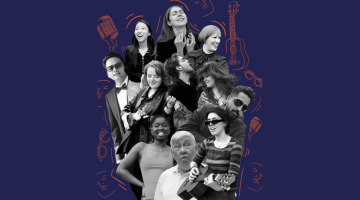
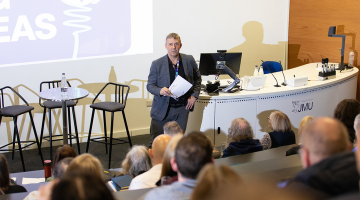
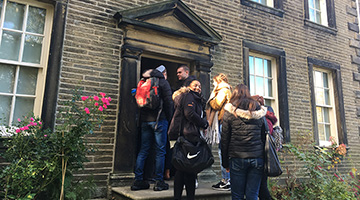
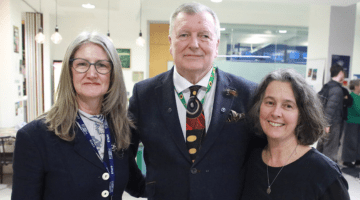
.png)
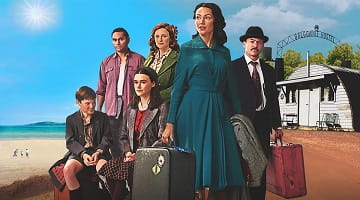

The university reserves the right to withdraw or make alterations to a course and facilities if necessary; this may be because such changes are deemed to be beneficial to students, are minor in nature and unlikely to impact negatively upon students or become necessary due to circumstances beyond the control of the university. Where this does happen, the university operates a policy of consultation, advice and support to all enrolled students affected by the proposed change to their course or module.
Further information on the terms and conditions of any offer made, our admissions policy and the complaints and appeals process.









